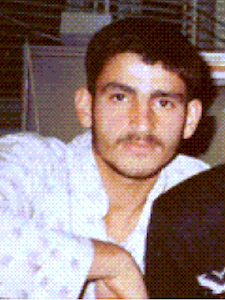Synopsis:
In 1980, as the world is captivated by the Iranian hostage crisis, aspiring doctor Hesam drops out of medical school in Rome and returns to Iran to serve his country. A member of the Revolutionary Guards Corps, he becomes a prison guard in Ahwaz, assigned to investigate and interrogate political prisoners. The more he learns about ethnic and religious tensions, however, the more he finds the concept of revolutionary justice questionable. Hesam finds solace in speaking with a defiant young prisoner with whom he develops a passionate bond. But when Hesam discovers damning evidence about the detainee, he has to choose between his political ideals and his conscience in a country where same-sex love is violently condemned.
On the Enemy’s Side is contemporary historical fiction, inspired by real events during a tumultuous period preceding the Iran Iraq war. Baika has crafted a memorable cast of characters of divergent and conflicting political allegiances, all who struggle to do the right thing in a morally complicated world. Astutely crafted, meticulously researched, and emotionally engaging, On the Enemy’s Side is a haunting modern classic about love during a civil war.
To buy the book, click here.
Endorsements:
On the Enemy’s Side is a journey into a real historical drama of the Iranian Revolution in 1979, told through a prison cell. A breath-taking story about love and courage, it uncovers the world of Iran’s ethnic and political diversity in the most intimate way. More crucially, the book is about finding an inner compass that leads through chaos, destruction and violence. With each sentence, one learns to be more historically aware, tolerant, courageous and loving. Heartbroken, a reader survives and thrives together with its protagonists, two outcasts who found themselves in the heart and hell of political turmoil and zeal, how to escape their own prejudices and hatred, starting a different kind of revolution.
Botakoz Kassymbekova, historian and author of Despite Cultures
In his powerful debut, On the Enemy’s Side, Hamour Baika tells a necessary love story: Set against the backdrop of the Iranian hostage crisis in 1980s Iran, he explores the complicated moral territory of a same-sex love between a political prisoner and interrogator. It’s necessary because it’s a story rarely told about gay men, especially in the Middle East during this time period. It’s necessary because it’s told with such urgency, beauty, and sensitivity. Baika layers in a hidden—and forbidden—history of gay men, giving those men a voice.
John Copenhaver, award-winning author of Dodging and Burning
Reviews:
Part of the beauty of this story is how the upheaval and questioning of ideas and ideology are brought to the individual level. Baika tells a variety of personal stories–of Bibi, of the young bride Esmat, of Hesam, and of Bahram. This novel is literary in tone and is reminiscent of the short story, “The Guest,” by Albert Camus. While Hesam and Bahram are at the center of the novel, the themes of identity, honor, and morality in the face of oppressive systems repeats with each character.
Excerpt from Angelic Rodgers’ review, originally published on Reedsy
One of the things I really liked about this book was that some of the significant characters were women. The gentle, quiet power of Iranian women in this story is remarkable. They work behind the scenes as they too search for justice.
Excerpt from Charlotte Kinzie’s review on Kinzie Things
Soundtrack:
For a selection of songs that accompany this story, click here.
Background:
Many incidents in this novel are based on real events.

The impetus for the story was born when I first read a short biography of Reza Mohammadzadeh Gazorgah. He was a sympathizer of the Tudeh Party, a Marxist-Leninist organization that supported the Iranian government. Yet, this support wasn’t enough to shield him from government oppression. Reza was arrested in May 1983 and died under torture soon after. I hadn’t previously read about executions or extrajudicial killings of people who supported the government. I was shocked at the injustice of this story and by the fact anyone with a different ideology was at risk, even when they supported the regime.
One of my primary goals for writing this novel was to restore the dignity of people who suffered violence and cruelty and whose stories shape the setting of the story. Some elements of Reza’s life have been incorporated in the protagonist’s backstory. My intention was to show the injustice to which he was subjected, and imagine a fictitious life that preserved his humanity.
Available information about Reza do not suggest he was gay.
For more information about him, visit this page.
